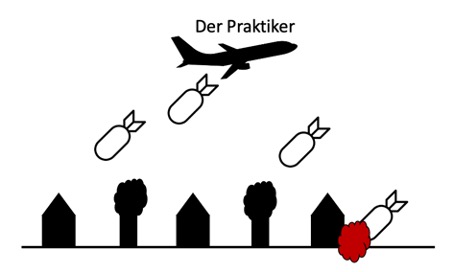Hands-on means solving a task as quickly and pragmatically as possible. Pragmatic stands for factual and quick action without thinking too much. The two terms are often combined under the heading: “practitioner”.
In general, this type of work is helpful to a healthy extent. Unfortunately, being a practitioner often means that you act exactly as you know it, without thinking theoretically and thinking about the effect or the exact reason. You then hear sentences like:
- “It is always done that way”,
- “I have a lot of experience with that”,
- “I know that!”
- “I’m just a practitioner”
The pragmatic practitioner
The term practitioner is often mentioned in relation to the hands-on mentality. A practitioner is the opposite of a theorist. Jeanne Moreau describes the practitioner as follows: The great practitioners do not talk, they act. Certainly there are advantages and disadvantages of being a practitioner.
In general, it is important to keep a balance between theory and practice. Even pure theorists do not achieve the desired success. It is about applying existing theoretical knowledge and one’s own experience in combination to solve a task.
Advantages of pragmatism
In general, pragmatism has its advantages. Pragmatic people make while others are still thinking, planning or considering which guidelines they have to adhere to. There is little discussion, it is done. The result is important! Pragmatists don’t get bogged down – they act!
Disadvantages of pragmatism
But where there is light, there is also shadow. The disadvantage associated with acting quickly is that possible variants are not considered or alternatives remain unchecked. They are often conventional and not very original solutions. Unfortunately, I notice that so-called “practitioners” are often very stuck in their own opinions and hardly open to new solutions. Reading books or helpful blog articles with new methods is also rejected as too theoretical. One would be a practitioner and therefore could not fall back on all kinds of documents.
Reading tip: Booksmart vs Streetsmart
The danger is that practitioners restrict themselves greatly in their own horizons. The conscious renunciation of existing knowledge and thus the restriction to one’s own knowledge is not expedient, especially in complex times. It is important to be open to new paths and not to lapse into actionism. The practitioner likes to use particularly agile methods to act on one’s own experience instead of in terms of methodology.
Leaders are prone to micromanagement
In particular, leadership should not be tried out on the “living object” (hands-on), but rather it should be treated carefully. Strategies should also be based to a certain extent on market studies and knowledge from the literature.
This is often followed by actionism among practitioners and a focus on known and essential points. As a manager, it feels like irregular little bomb impacts with the practitioner. The focus is on many small topics and the practitioner hardly sees the big picture. The practitioner looks at each topic in detail without looking at the big picture and poaches around in chat rooms and gives his opinion on every project, always focusing on a detail that is not done as he knows it.

Conclusion
It is always advisable to reflect on yourself and to find the right balance between practitioner and theorist. Of course, quick and efficient action is important, but the inclusion of existing knowledge and broadening one’s own horizons is also an important aspect. I would never call myself a practitioner or a theorist – I take the best of both worlds.
Reading tip: Generalist vs specialist
[werbung] [fotolia]


